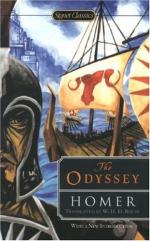Then Telemachus spoke, “Shameless,” he cried, “and insolent suitors, let us feast at our pleasure now, and let there be no brawling, for it is a rare thing to hear a man with such a divine voice as Phemius has; but in the morning meet me in full assembly that I may give you formal notice to depart, and feast at one another’s houses, turn and turn about, at your own cost. If on the other hand you choose to persist in spunging upon one man, heaven help me, but Jove shall reckon with you in full, and when you fall in my father’s house there shall be no man to avenge you.”
The suitors bit their lips as they heard him, and marvelled at the boldness of his speech. Then, Antinous, son of Eupeithes, said, “The gods seem to have given you lessons in bluster and tall talking; may Jove never grant you to be chief in Ithaca as your father was before you.”
Telemachus answered, “Antinous, do not chide with me, but, god willing, I will be chief too if I can. Is this the worst fate you can think of for me? It is no bad thing to be a chief, for it brings both riches and honour. Still, now that Ulysses is dead there are many great men in Ithaca both old and young, and some other may take the lead among them; nevertheless I will be chief in my own house, and will rule those whom Ulysses has won for me.”
Then Eurymachus, son of Polybus, answered, “It rests with heaven to decide who shall be chief among us, but you shall be master in your own house and over your own possessions; no one while there is a man in Ithaca shall do you violence nor rob you. And now, my good fellow, I want to know about this stranger. What country does he come from? Of what family is he, and where is his estate? Has he brought you news about the return of your father, or was he on business of his own? He seemed a well to do man, but he hurried off so suddenly that he was gone in a moment before we could get to know him.”
“My father is dead and gone,” answered Telemachus, “and even if some rumour reaches me I put no more faith in it now. My mother does indeed sometimes send for a soothsayer and question him, but I give his prophecyings no heed. As for the stranger, he was Mentes, son of Anchialus, chief of the Taphians, an old friend of my father’s.” But in his heart he knew that it had been the goddess.
The suitors then returned to their singing and dancing until the evening; but when night fell upon their pleasuring they went home to bed each in his own abode. {12} Telemachus’s room was high up in a tower {13} that looked on to the outer court; hither, then, he hied, brooding and full of thought. A good old woman, Euryclea, daughter of Ops, the son of Pisenor, went before him with a couple of blazing torches. Laertes had bought her with his own money when she was quite young; he gave the worth of twenty oxen for her, and shewed as much respect to her in his household as he did to his own wedded wife, but he did not take her to his bed for he feared his wife’s




